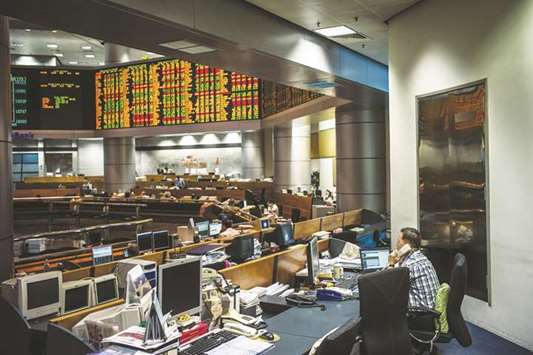With Malaysia’s stocks near a two-year high, one top fund manager expects the market to stop and catch its breath before taking another leg higher on Chinese investment and improvement in corporate earnings.
While the benchmark FTSE Bursa Malaysia KLCI Index has gained 9.2% this year, there are still plenty of opportunities in small and mid-cap stocks, said Lee Sook Yee, chief investment officer of Kenanga Investors. The Kenanga Growth Fund which Lee manages, has returned an average of 16% over five years, outperforming 95% of its peers.
“One of the themes crucial to watch is Chinese foreign direct investments,” she said in an interview on June 5. “That theme itself is going to drive the share price of a lot of companies,” said Lee, who helps oversee 8bn ringgit ($1.9bn) in assets and was named Asia Asset Management’s Malaysia CIO of the Year for the past two years.
Kenanga Investors has about 12 analysts and fund managers who each visit at least four companies every month, said Lee. “We are very bottom up and fundamental,” she said, adding that the firm’s “thorough research” is key to its success.
Technology stocks are among the firm’s top picks on expectations of demand for semiconductor-related products for new phone models, including Apple’s iPhone. Construction and infrastructure stocks are also among the investment manager’s favourites, driven by the nation’s demand for new rail links, expressways and ports.
While Kenanga has been a net buyer this year, Lee cautions about a near-term pullback. “After a strong rally in the first five months, I expect the market to take a breather, which is essentially happening,” she said, citing profit-taking on concern over US interest rate hikes and downgrades of corporate earnings estimates. The recent tech rout is “nothing fundamentally too serious,” Lee said in a follow-up email on Tuesday.
Malaysia’s economy grew at the fastest pace in two years in the first quarter of the year as exports surged. This wasn’t reflected in the latest set of corporate earnings, Lee said, adding that seasonality may have also been a factor in the disappointing results. “For the market to re-rate further, we need corporate earnings to deliver,” Lee said.
Another challenge may be presented by Prime Minister Najib Razak’s expected call for early elections. While an election can spur expectations for the government to “pump prime” the economy, uncertainty over the outcome may dampen sentiment after the polling date is announced, said Lee.
Chinese investment has been crucial to Najib’s bid to reinvigorate the economy, with FDI climbing amid infrastructure projects related to the multibillion dollar Belt and Road Initiative. Local companies in November signed a record 144bn ringgit in agreements with Chinese partners, including Alibaba Group Holding.
Shares of Pos Malaysia, the national postal company which is seen as a direct beneficiary of the Alibaba deal, have more than doubled in the past 12 months. A gauge of technology stocks is trading near a 12-year high, with semiconductor- related names Inari Amertron, Vitrox Corp and Globetronics Technology gaining from 40 to 93% in the past year. Malaysia’s benchmark stock index closed 0.4% higher yesterday amid a global rebound in technology shares.
Still, not all investors are convinced of the benefits of Chinese investment for Malaysia. While acknowledging it has had a positive impact on sentiment in the wake of the 1MDB probe, Henderson Global Investors Ltd fund manager Sat Duhra warns that “there will be a price to pay for this at some point.” Duhra co-manages the Henderson Horizon Asian Dividend Income Fund that has no exposure to Malaysian equities due to high valuations and political risk.
“The Chinese support is part of China’s attempt to grow influence with Asian counterparts,” said Singapore-based Duhra. “Renewed FDI from China is compelling in the short term, but the long-term cost is a more dominant China that will be economically intertwined in Asean, and this will mean a stronger force in all matters political and military in Asia.”
Kenanga’s Lee argues that China’s growing investment and the positive impact it should have on Malaysia’s economy and corporate earnings can’t be ignored. She notes that the theme has helped attract foreign investors, who have been net buyers of Malaysian equities for the last 18 straight weeks.
“The bilateral ties, the FDI theme, it’s very real,” Lee said.

Traders and stock owners are seen on the floor of the RHB Investment Bank in Kuala Lumpur. With Malaysia’s stocks near a two-year high, one top fund manager expects the market to stop and catch its breath before taking another leg higher on Chinese investment and improvement in corporate earnings.
